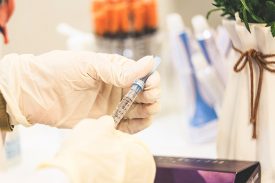
Six Women Developed Rare Blood Clots After COVID-19 Shot
WINDSOR TERRACE — In the wake of six women developing blood clots after receiving the Johnson & Johnson COVID-19 vaccine, both the U.S. Food and Drug Administration and the Centers for Disease Control recommended Tuesday that states stop administering the shot.
According to state health commissioner Dr. Howard Zucker, New York will immediately halt distribution of the J&J vaccine at state-run vaccination sites.
“New York State will follow the CDC and FDA recommendation and pause the use of the Johnson & Johnson vaccine statewide immediately today while these health and safety agencies evaluate next steps,” Zucker said on Tuesday, April 13.
New Yorkers scheduled to receive the J&J vaccine at state mass vaccination sites will instead receive the Pfizer vaccine, Zucker announced.
One of the six women died after developing the blood clots, and a second woman is currently in the hospital in critical condition. The six women, ranging in age from 18 to 48, developed the blood clots within two weeks of receiving the vaccine.
Nearly seven million people in the U.S. have received the J&J vaccine. The vaccine is delivered in one dose, unlike the vaccines developed by Pfizer and Moderna, which are administered in two doses.
COVID-19 vaccines have been distributed at pop-up vaccination sites around New York City, including St. Leo’s Church and Our Lady of Sorrows Church in Corona.
Councilman Francisco Moya, a Democrat representing Corona, Elmhurst, and East Elmhurst, worked to establish vaccination sites in his district.
St. Leo’s Church administered the J&J vaccine April 8-10, vaccinating a total of 366 people. Our Lady of Sorrows Church administered vaccines April 1-4, vaccinating a total of 469 people. Both the J&J vaccine and Moderna were distributed at Our Lady of Sorrows, according to Moya.
“Our health and hospital professionals have been very thorough before and after someone gets vaccinated. So any recommendation out of an abundance of caution is welcomed to ensure we can continue fighting COVID-19 in the best way possible,” Moya said. “And while this pause slows down getting folks fully vaccinated, the state and the city need to ensure the Pfizer and Moderna vaccines distribution are prioritized to communities like mine. The communities across my district, especially in Corona, have been the most vulnerable to and impacted by COVID-19.”
The FDA and the CDC announced Tuesday they would stop using the J&J vaccine at federal distribution sites as a precaution. The agencies recommended states also halt distribution until safety issues are investigated. The CDC has scheduled for Wednesday an emergency meeting of its outside advisory committee.
The blood clot the six women developed, known as cerebral venous sinus thrombosis, is extremely rare.
Dr. Anne Schuchat, principal deputy director of the CDC, and Dr. Peter Marks, director of the FDA’s Center for Biologics Evaluation and Research, issued a joint statement explaining the stoppage was happening out of an abundance of precaution.
“Right now, these adverse events appear to be extremely rare,” the statement read.
Dr. Robert Tiballi, an infectious disease specialist, said the pause will give researchers time to investigate.
“Halting of further use of the J&J vaccine will allow epidemiological research into the specific nature of the clotting disorders, review of medical conditions specific to those persons with the clotting events and a better understanding of what may have led to the clotting — the vaccine or other causes,” Tiballi explained. “This does not mean, at this time, that the vaccine is believed to be causing the clotting disorder, but rather that these events need to be studied.”
“It should be noted that these are rare events — six reported events in over five million persons vaccinated, less than one in a million doses,” Tiballi added.
Tiballi explained the difference between the J&J vaccine and the other COVID-19 vaccines.
“The J&J vaccine is a vector-based vaccine, much like the Astra Zeneca/Oxford vaccine, which has been under review for similar suspected post-vaccination clotting concerns,” he said. “The mRNA vaccines (Pfizer & Moderna) are a different type of vaccine technology and do not have such suspected clotting issues associated with them.”
Johnson & Johnson issued a statement saying the company is aware of the reports of blood clots. But the company also pushed back against the idea that the vaccine was the cause.
“At present, no clear causal relationship has been established between these rare events and the Janssen COVID-19 vaccine,” the statement read.
Janssen is the division at Johnson & Johnson, where the vaccine was researched and developed.
